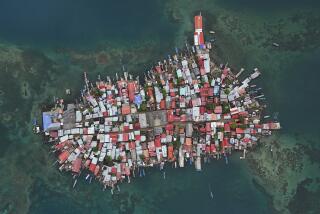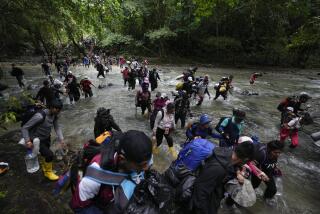Rivals Try to Flag Down Panama Ship Business : Commerce: With U.S. ports off-limits to vessels from Noriega’s nation, other countries grab for the windfall.
NASSAU, Bahamas — The U.S. ban on Panamanian-registered ships in U.S. ports has set off what one shipping specialist calls “a feeding frenzy” in flag-of-convenience countries such as this small island nation that are anxious to pick up the registrations that Panama loses.
“Everybody’s pushing, and their tactics are very aggressive,” said Lawrence I. Brown, a Greenwich, Conn., attorney who specializes in ship registrations for Liberia and the tiny Pacific island nation of Vanuatu. “I feel like I should be sending royalty checks to Noriega.”
The ban, announced by President George Bush as he departed for the Malta summit early this month, is to take effect after Jan. 31. It was designed as a significant addition to the economic arsenal that Washington has deployed against Panama’s strongman, Gen. Manuel A. Noriega, who has been indicted in the United States on drug charges.
Until the U.S. port ban, Panama rivaled Liberia as the world’s leading flag of convenience. Registrations netted the Panamanian government about $50 million annually in fees and taxes, and U.S. officials estimate that Noriega and his cronies took another $40 million in bribes and kickbacks. They said the ban affects 1,500 or more of the 6,121 ships registered in Panama.
Brown said the two countries that he represents probably will pick up more than 400 of the registrations as owners of ships flying the Panamanian flag scurry to acquire safe, new flags before the deadline.
Although it stunned many shipowners, Bush’s announcement prompted countries such as the Bahamas, a relative newcomer to open shipping registry, to move as if a starter’s gun had sounded. Today, a little more than two weeks later, it appears that the quick marketing campaigns are paying off for the dozen or so open registry countries now aggressively grabbing for the Panamanian ships.
Bahamas Prime Minister Lynden O. Pindling said that as soon as the ban was announced, he personally called several cruise lines that regularly sail in Caribbean and Bahamian waters, urging them to shift from Panamanian to Bahamian registry.
“We said to the world’s shipowners, ‘Come check us out,’ ” the prime minister said, frankly acknowledging his hard-sell campaign.
Pindling spoke glowingly of the Bahamas’ windfall during a showy news conference with Carnival Cruise Lines held at Carnival’s elaborate Crystal Palace resort here last week. The news conference announced the Bahamian re-registration of four of the lines’ biggest ships that until now have flown the Panamanian flag.
Capt. Alan L. Morris, who operates out of London as director of maritime affairs and registrar for Bahamian shipping, said the Carnival registrations were only a small part of the more than 150 ships now flying the Panama flag that he expects to re-register in the Bahamas before the U.S. ban takes effect.
According to James Lawrence, publisher of shipping newsletter International Ship Registry, a number of other small countries new to open registry shipping also are enjoying a windfall from the U.S. port ban. He cited, in particular, St. Vincent and the Grenadines, an island nation in the Caribbean, and the Marshall Islands in the Pacific.
“The Marshalls more than doubled their fleet overnight,” Lawrence said. He cited the move to the Marshalls last week of 13 Panama-registered ships of Evergreen Marine Corp., the world’s largest container line.
The richest targets are Japanese and Hong Kong Chinese shipowners, said Philip Loree, chairman of the Federation of American-Controlled Ships, a lobbying group of U.S. owners of ships registered in Panama, Liberia and the Bahamas.
Japan is the leading nation on the Panamanian registry, with 1,388 Panama-flagged ships, and Hong Kong is second, according to the Journal of Commerce, which has been watching the re-registry scramble closely.
“They (the open registry countries) are scurrying all over Japan looking for business,” said Brown.
Loree and other shipping specialists agreed that the clear winner in the marketing race is Liberia, which Loree said stands to pick up more than 300 of an expected total of 1,000 to 1,500 Panama re-flaggings.
“According to what I call the ‘pond theory,’ when you look out the window from Japan you see Panama first, then you see Liberia,” Loree joked. He explained that the two are the oldest of the flag-of-convenience countries, both established by the United States. Thus, they are far more experienced in handling registrations and offering political support for their fleets. With the squeeze on Panama, it is natural that Liberia will take up the biggest share of the slack, he said.
Ironically, Panamanian maritime lawyers and officials involved in ship registry have been quick to cooperate with the besieged shipowners who must change flags to continue calling on U.S. ports, Loree said. “They’re doing everything to create and keep good will in the hope that when this is all over, the shipowners will remember and come back.”
Another irony, according to Loree, is that the Panamanian marine lawyers who are most hurt by the U.S. ban are almost universally opposed to Noriega. “Noriega’s bank account isn’t going to suffer,” he said, expressing doubt that the ban adds any significant pressure on the strongman to step down.
Brown, the ship registry attorney, sardonically agreed. “If Noriega is dealing drugs as people say, and he loses $50 million or $60 million on this, he can always run another plane load of cocaine to make it up.”
Research librarian Tom Lutgen also contributed to this report.
More to Read
Sign up for Essential California
The most important California stories and recommendations in your inbox every morning.
You may occasionally receive promotional content from the Los Angeles Times.









